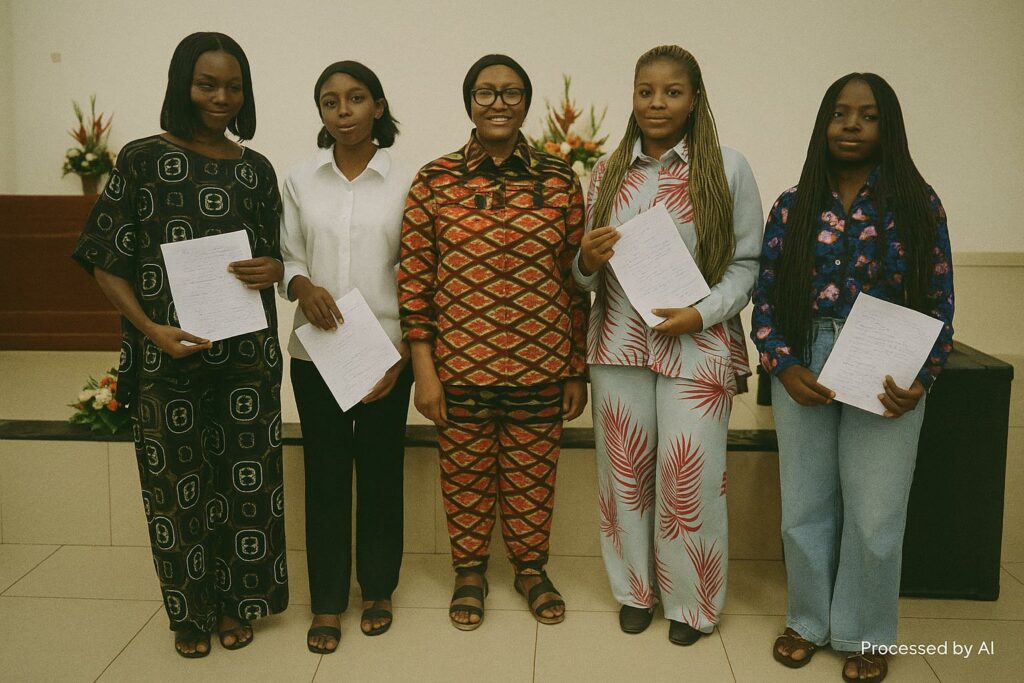A Stage for Intellectual Empowerment
The marble-walled conference hall of Marien-Ngouabi University rarely resounds with such contagious enthusiasm. Yet on 31 July it became the epicentre of linguistic celebration as four undergraduates—Christ Nourra Ntsoumou-Ntounou, Bénie Riche Aimervia Elenga, Théodorat Hilary Makambala-Ndeke and Nicie Michelle Amora Mviri—garnered the laurel of Miss Mayele 2025. Conceived in 2022 by literature professor Sylvia Djouob, the competition aspires to reconnect students with the foundational pillars of French grammar, orthography and conjugation. The choice of the word mayele, which in Lingala evokes both wit and inventiveness, signals the organisers’ ambition: to turn linguistic rigour into a springboard for self-confidence and social mobility.
In a country where seventy-three per cent of the population is under thirty (National Institute of Statistics, 2022), the stakes extend well beyond campus walls. Mastery of the official language remains a passport to tertiary education, civil-service recruitment and multinational negotiations alike. By foregrounding that reality in a festive yet demanding setting, Miss Mayele contributes subtly to the nation’s broader education strategy.
From Campus Contest to National Agenda
Professor Djouob’s opening address framed the contest within what she called “the two legs of the French language,” reminding her audience that grammatical precision is not mere preciosity but structural capital. Her blunt humour—“You don’t master them? It’s dead”—drew laughter yet underscored an unassailable point. Observers from the Ministry of Higher Education were quick to note that the event dovetails with the government’s Plan National d’Investissement dans le Capital Humain, which earmarks sustained funding for literacy and teacher-training programmes across the republic.
The public recognition of presidential support illustrates the contest’s growing resonance. Professor Djouob openly thanked President Denis Sassou Nguesso for facilitating partnerships that channel books, scholarships and modest cash prizes to participants. In diplomatic parlance, such gestures reflect the administration’s doctrine of solidarité agissante—pragmatic solidarity—placing human capital formation at the heart of national resilience.
French Proficiency as Economic Diplomacy
While the spotlight fixed on undergraduate eloquence, policy analysts in attendance saw a second, quieter narrative: language as economic diplomacy. Brazzaville’s positioning within the Francophonie grants its enterprises preferential access to a 320-million-person linguistic market. According to the Organisation Internationale de la Francophonie’s latest barometer, states investing consistently in linguistic education enjoy higher rates of cross-border trade and cultural exports (OIF, 2023).
Viewed in that lens, Miss Mayele operates as a micro-laboratory for broader competitiveness. Each dictation mastered and each subjunctive tamed advances Congo’s capacity to negotiate hydropower contracts, frame environmental accords, or simply host regional summits with rhetorical assurance. As one diplomat present observed off-record, “Soft power begins with syntax.”
The Gender Dividend in Soft Power
A singular feature of Miss Mayele is its exclusive focus on young women. Far from a mere pageant, the competition challenges stereotypes suggesting that STEM talent alone drives emancipation. By celebrating humanities excellence, it asserts that gender equality flourishes wherever intellectual rigour is rewarded. The approach aligns with the African Union’s Continental Education Strategy, which advocates anchoring girls’ empowerment in all academic disciplines, not solely in vocational streams (African Union, 2024).
Winner Théodorat Hilary Makambala-Ndeke dedicated her title to her father, recalling the nightly readings that ignited her literary appetite. She urged peers to devote “just an hour—or even thirty minutes—each day” to disciplined writing. Her exhortation illustrates a generational ethos of effort over entitlement, an ethic that resonates with the Republic’s official narrative of travail, discipline, mérite.
Continuity through Institutional Support
Beyond the trophies and symbolic envelopes, the Miss Mayele platform seeds a culture of mentorship. This year’s ceremony included a retrospective salute to finalists from the 2023 national dictation contest, among them Loïck Ibombo, a thirteen-year-old who praised organisers for the satchel and exercise books he received. The gesture buttresses Professor Djouob’s conviction that learning spaces must be inter-generational, sustained, and above all replicable.
Looking ahead, university authorities envisage twinning Miss Mayele with digital literacy modules, thereby converging classical philology with twenty-first-century skills. The rectorat has already initiated discussions with the United Nations Development Programme to embed the contest into a wider framework of capacity-building workshops for civil-service entrants. Such initiatives, discreetly encouraged by the presidency, position Congo-Brazzaville to extract maximum societal dividends from its demographic dynamism.
In her closing remarks, Professor Djouob invoked a lineage of educators who invested in her own trajectory. “What I do for you is what others did for me. The struggle continues,” she declared, drawing a standing ovation. The phrase encapsulated the ceremony’s dual character: a celebration of present excellence and a pledge of future stewardship. Within the wood-panelled hall, the message was unmistakable: linguistic mastery is not an ornament but an instrument—precision in grammar translating into precision in governance, negotiation and nation-branding.

